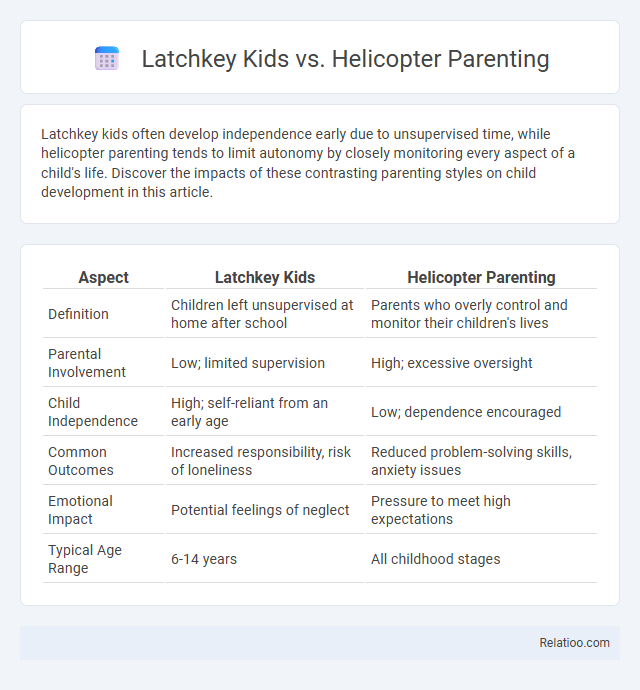Latchkey kids often develop independence early due to unsupervised time, while helicopter parenting tends to limit autonomy by closely monitoring every aspect of a child's life. Discover the impacts of these contrasting parenting styles on child development in this article.
Table of Comparison
| Aspect | Latchkey Kids | Helicopter Parenting |
|---|---|---|
| Definition | Children left unsupervised at home after school | Parents who overly control and monitor their children's lives |
| Parental Involvement | Low; limited supervision | High; excessive oversight |
| Child Independence | High; self-reliant from an early age | Low; dependence encouraged |
| Common Outcomes | Increased responsibility, risk of loneliness | Reduced problem-solving skills, anxiety issues |
| Emotional Impact | Potential feelings of neglect | Pressure to meet high expectations |
| Typical Age Range | 6-14 years | All childhood stages |
Understanding Latchkey Kids: Definition and History
Latchkey kids refer to children who return to an empty home after school because their parents are working or otherwise unavailable, a phenomenon that gained prominence during the 1970s following increased dual-income households and single-parent families. This term historically highlights the independence and challenges faced by these children, often left to care for themselves without adult supervision during after-school hours. In contrast, helicopter parenting involves highly involved and controlling parenting styles focusing on constant monitoring and intervention, which starkly differs from the autonomy experienced by latchkey kids.
What is Helicopter Parenting? Key Traits Explained
Helicopter parenting refers to a style where parents are overly involved in their children's lives, constantly monitoring and controlling their activities to protect them from failure or harm. Key traits include excessive supervision, a tendency to solve problems for children rather than allowing independence, and frequent interference in social, academic, or extracurricular matters. This contrasts with latchkey kids, who often experience early independence due to minimal parental oversight, fostering self-reliance but sometimes lacking support.
Developmental Impact of Independence vs Supervision
Latchkey kids often develop a strong sense of independence and self-reliance as they navigate daily routines without constant supervision, fostering problem-solving skills and confidence. In contrast, helicopter parenting, characterized by excessive oversight and intervention, can limit a child's opportunity to learn autonomy, potentially hindering emotional resilience and decision-making abilities. Balancing supervision with opportunities for independent growth supports your child's developmental needs, promoting both safety and personal competence.
Emotional Well-being: Anxiety vs Confidence
Latchkey kids often develop greater independence and self-confidence due to managing responsibilities alone, but may face heightened anxiety from lack of immediate parental support. Helicopter parenting, characterized by over-involvement and constant supervision, can lead to increased anxiety and reduced emotional resilience as children rely heavily on adult intervention. Balancing autonomy and support is crucial for emotional well-being, promoting confidence while minimizing anxiety in both parenting styles.
Academic Performance: Self-Motivation or Parental Pressure
Latchkey kids often develop strong self-motivation and independence, leading to improved academic performance through personal initiative rather than direct parental oversight. Helicopter parenting, characterized by intense parental pressure and constant involvement, can hinder your child's ability to develop autonomous learning skills, sometimes causing anxiety and reduced academic resilience. Balancing support and freedom is crucial to fostering a child's academic success without overwhelming them with excessive control.
Social Skills: Networking Independently or Reliance on Adults
Latchkey kids often develop strong independent social skills by navigating peer interactions and networking without constant adult supervision, fostering self-reliance and problem-solving abilities. In contrast, helicopter parenting can limit a child's opportunity to build these skills independently, as heavy adult involvement may create reliance on parental guidance for social situations. Your child's ability to network effectively depends on balancing independence with appropriate support, encouraging confidence in social settings while ensuring emotional security.
Safety Concerns: Latchkey Risks and Helicopter Safeguards
Latchkey kids face increased safety concerns due to unsupervised time at home, heightening risks of accidents, emergencies, or exposure to unsafe environments. Helicopter parenting mitigates these risks by closely monitoring children's activities and environments, ensuring constant supervision and prompt intervention in potentially dangerous situations. Balancing independence and safety remains critical as excessive control can impact a child's development while insufficient supervision may compromise their well-being.
Long-term Effects on Career and Problem Solving
Latchkey kids often develop strong independence and problem-solving skills due to early exposure to managing tasks alone, which can positively influence long-term career adaptability and resilience. Helicopter parenting, characterized by over-involvement, may limit opportunities for autonomous decision-making, potentially hindering the development of critical problem-solving abilities and reducing adaptive capacity in professional environments. The balance between supervised support and independent experience plays a crucial role in shaping career outcomes, where moderate guidance fosters competence and confidence essential for complex workplace challenges.
Parenting Strategies: Striking the Right Balance
Effective parenting strategies involve balancing independence and supervision to support healthy child development. Latchkey kids experience increased autonomy due to minimal parental presence after school, which can foster self-reliance but also risks safety and emotional challenges. Helicopter parenting offers constant oversight and involvement, aiming to protect and guide but sometimes limits children's decision-making skills, highlighting the importance of striking a balance that encourages both freedom and appropriate support.
Which Approach Fits Today's Changing World?
Latchkey kids develop independence and self-reliance by learning to navigate the world alone after school, while helicopter parenting emphasizes constant supervision and involvement to ensure safety and success. In today's rapidly evolving society, a balanced approach that fosters autonomy yet offers emotional support and guidance best fits the needs of modern children. Embracing flexible parenting strategies that adapt to digital technology and social complexities helps prepare kids for future challenges without stifling their growth.

Infographic: Latchkey Kids vs Helicopter Parenting
 relatioo.com
relatioo.com